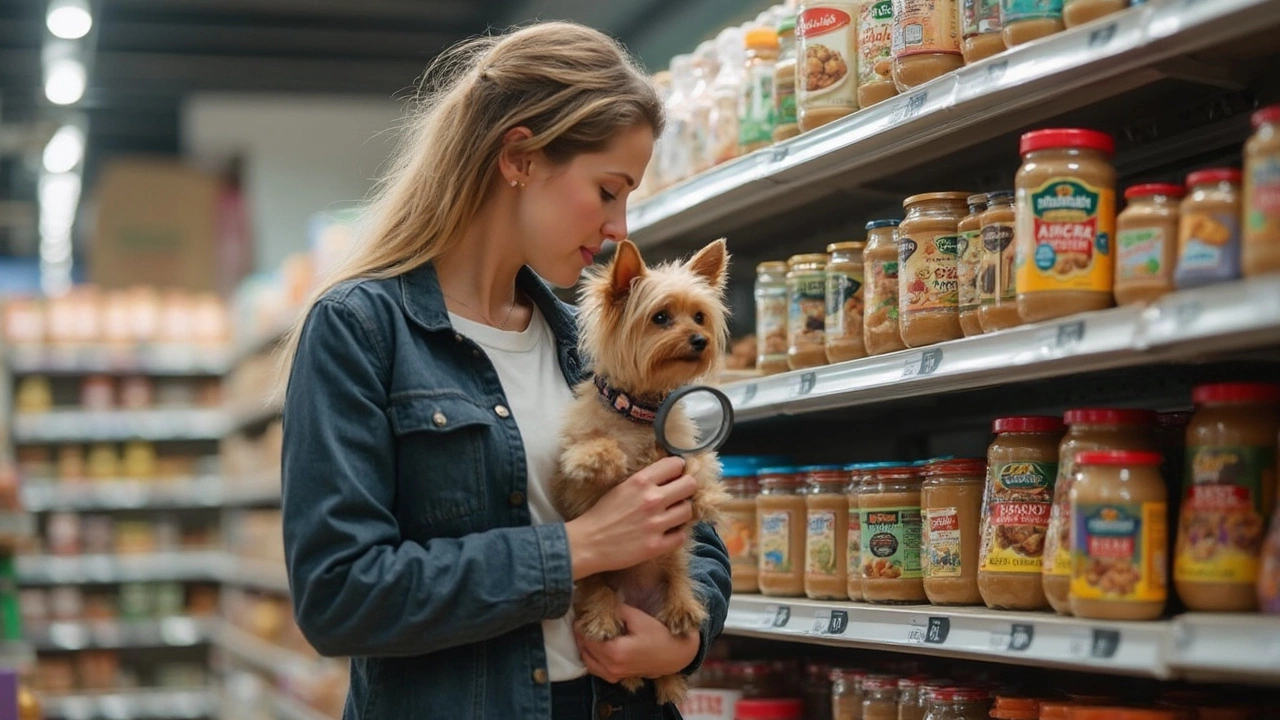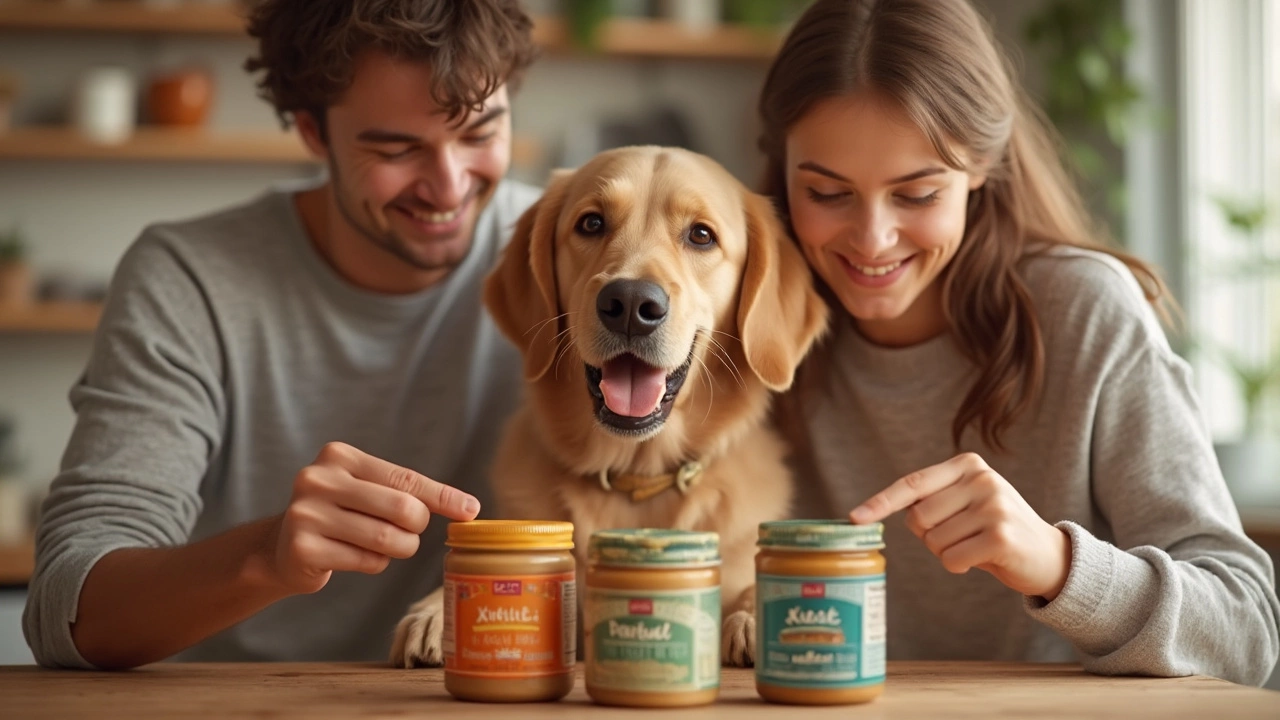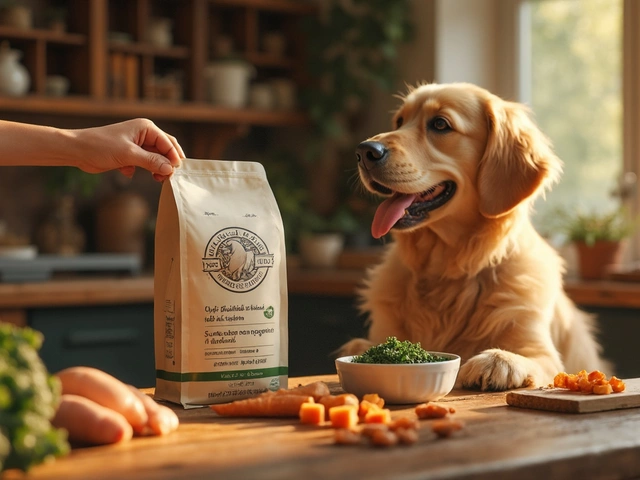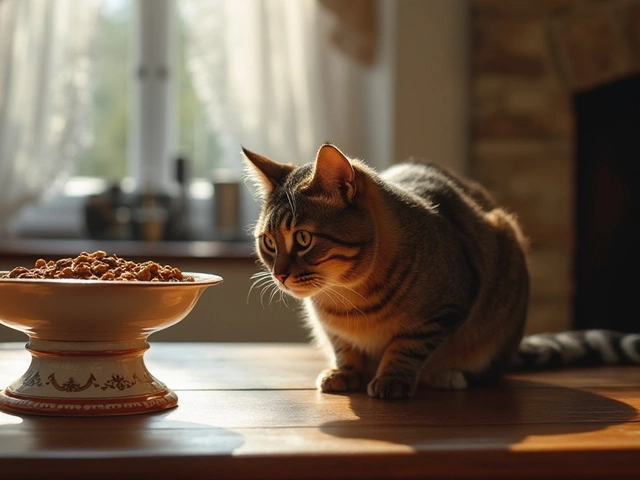Peanut butter seems like the perfect treat for dogs — creamy, tasty, and easy to hide pills in. But a lot of people don't realize that some brands can be dangerous for pets. The biggest problem? Xylitol. This sugar substitute pops up in tons of today's 'healthier' peanut butters and it's deadly for dogs, even in small amounts.
If you grab peanut butter off the shelf, don’t assume it’s dog-safe just because it looks basic or claims to be all-natural. Ingredients matter. Your best move is grabbing the jar and checking the label for xylitol or anything artificially sweetened. Even if a company says it's 'sugar-free,' that usually means xylitol or another substitute is in the mix. You want something that's literally just peanuts—or peanuts, salt, and maybe a dash of oil. That’s it.
- Why Peanut Butter Can Be Risky
- Safe Brands: What to Look For
- Popular Store Brands Reviewed
- Tips for Serving Peanut Butter to Dogs
Why Peanut Butter Can Be Risky
Lining up a spoonful of peanut butter for your dog sounds harmless, but here’s where things get tricky. The ingredient everyone needs to watch out for is xylitol. This sweetener is safe for people, but it’s downright toxic for dogs. Even a tiny bit can tank your dog’s blood sugar in minutes, cause seizures, liver failure, or worse.
What makes it scarier is that xylitol pops up in more brands every year, especially the ones labeled as “sugar-free” or “low calorie.” Dogs are way more sensitive to it than humans. Just 0.1 grams per kilogram of body weight can make a medium-sized dog deathly ill. To put that in perspective, a big spoonful of the wrong peanut butter could send a 40-pound dog to the emergency vet.
It’s not just about sweeteners. Flavored peanut butters sometimes add stuff like chocolate, raisins, or nutmeg — all things that can make dogs sick. Even too much salt or added oils aren’t great for them, especially if your pup has health issues.
Check out how these ingredients stack up for dogs:
| Ingredient | Common Use | Effect on Dogs |
|---|---|---|
| Xylitol | Sugar substitute | Extremely toxic: Lowers blood sugar, causes liver damage |
| Chocolate | Flavoring | Poisonous: Can cause vomiting, seizures, death |
| Salt | Preservative | Too much: Dehydration, salt poisoning risk |
| Added Oils | Texture/taste | Weight gain, digestive upset |
Bottom line? Always check labels before giving your dog any peanut butter. The wrong choice could turn an everyday treat into a dangerous emergency. For peanut butter for dogs, simple is always safer: stick to peanut butters with just peanuts and maybe a little salt.
Safe Brands: What to Look For
When you're hunting for peanut butter for dogs, it all boils down to ingredients. Forget the flashy packaging or the latest "protein power" ads. Your dog doesn’t care about flavor swirls or added vitamins—they care about what won’t send them to the emergency vet.
Here's what matters most when picking a jar:
- No xylitol. This sugar substitute is the number one danger. Some peanut butter companies use it in their "sugar-free" options, but xylitol can tank a dog’s blood sugar in minutes and cause liver damage.
- Simple ingredient lists. The safest choice is the stuff with nothing but peanuts. You might see a pinch of salt or a little oil, but skip anything with sweeteners, chocolate, raisins, or added flavorings.
- Low sodium levels. A bit of salt won’t hurt most dogs, but too much isn’t great if your pup already battles heart or kidney problems.
- Smooth or chunky? Both are fine for most dogs. Tiny dogs or puppies may do better with smooth, just to avoid chunks getting stuck in their teeth or throat.
Let’s call out a few popular brands that fit the bill. The following are considered safe and easy to find:
- Smucker’s Natural Peanut Butter (just peanuts and salt, no xylitol)
- 365 by Whole Foods Organic Peanut Butter
- Crazy Richard’s 100% Peanuts
- Trader Joe’s No Salt Added Peanut Butter
- Good & Gather (Target’s store brand) Unsweetened Peanut Butter
Skip any jars that advertise “no sugar” or “sugar-free” unless the label proves they’re clear of xylitol. Always double-check, since companies sometimes change recipes.
Here’s a quick comparison so you can see how these brands stack up on dog safety:
| Brand | Xylitol-Free | Main Ingredients | Approx. Sodium per Tbsp |
|---|---|---|---|
| Smucker’s Natural | Yes | Peanuts, Salt | 25mg |
| Crazy Richard’s | Yes | Peanuts | 0mg |
| Trader Joe’s No Salt Added | Yes | Peanuts | 0mg |
| 365 Organic | Yes | Peanuts, Salt | 30mg |
| Jif (regular) | Yes, but contains sugar and additives | Peanuts, Sugar, Molasses, Oil, Salt | 60mg |
Notice that even so-called safe mainstream brands (like Jif) often add sugar and extra stuff your dog doesn’t need. Stick to labels with the shortest ingredient lists and you’ll never go wrong.

Popular Store Brands Reviewed
When you're in the peanut butter aisle trying to pick something safe for your dog, a few brands stand out. Here's the real deal on some common jars you’ll find at the store.
- Jif: This one's everywhere. The good news: regular Jif doesn’t have xylitol. The downside: it does have sugar, salt, and a few oils. It's fine in occasional, tiny amounts for most dogs, but if your buddy has health issues or you're picky, go simple.
- Skippy: Regular Skippy is also xylitol-free as of today, but it includes sugar and palm oil. Not ideal for daily treats, but not a crisis for the rare spoonful.
- Peter Pan: No xylitol here either, but again–there’s added sugar and salt. Always double check the label if you see a new "reduced sugar" or "sugar free" version, since recipes do change.
- Smucker’s Natural: If you want to play it extra safe, this one’s usually just peanuts and a pinch of salt. No added sugar, no funny stuff. Slide this toward the front of the shelf if you use peanut butter often for dog treats.
- 365 by Whole Foods: Their "creamy peanut butter" (just peanuts and salt) is a smart choice for minimalists. Always check ingredients, since store brands sometimes switch things up.
The one thing you need to lock in your memory: look for unsweetened, natural, or "just peanuts" peanut butter if you’re serious about safety. Don’t trust “sugar-free” or diet versions unless the label shows zero xylitol. Natural brands like Crazy Richard’s or Teddie’s get bonus points for keeping it basic. No hidden sweeteners, just simple peanuts—these are the MVPs for peanut butter for dogs.
Brands to steer far away from? Anything with "xylitol" (sometimes called "birch sugar"). Even a smear of that can make your dog dangerously sick. Stick to the tried-and-true jars, read your labels, and you'll both stay happy.
Tips for Serving Peanut Butter to Dogs
Serving peanut butter is way more than just scooping and hoping for the best. First off, even safe brands should be given in moderation. Too much peanut butter—safe or not—packs lots of fat and calories your dog doesn't need. Treat it like a reward, not a meal replacement.
Stick to a teaspoon for small dogs, up to a tablespoon for the big ones. That might not sound like much, but it goes a long way with dogs. Spread it on a treat, stuff it in a Kong, or smear a small amount on a lick mat if you want to keep your pup busy and happy during baths or nail trims. Also, always double-check labels every time you buy, even from trusted brands. Sometimes they change recipes without warning.
Best tip? Never use peanut butter as a quick fix for training or calming your dog if they have a history of weight issues, diabetes, or pancreatitis. The fat content can make these problems worse. If your dog’s on medication, peanut butter is great for hiding pills—just make sure the jar is xylitol-free and unsweetened for complete peace of mind.
- Use as a special treat—don’t make it a daily habit.
- Go for unsalted, unsweetened, and xylitol-free brands.
- Keep portions small: about 1 teaspoon for small dogs, 1 tablespoon for large.
- If your dog is a puppy, start even smaller; their stomachs are more sensitive.
- Always supervise your dog, especially with toys stuffed with peanut butter to prevent choking.
Here's a quick guide to safe serving sizes by weight:
| Dog Weight | Safe Serving Size | How Often |
|---|---|---|
| Under 20 lbs | ½–1 teaspoon | 1–2 times/week |
| 20–50 lbs | 1–2 teaspoons | 1–2 times/week |
| 50+ lbs | 1 tablespoon | 1–2 times/week |
If you're ever unsure, check with your vet before giving your dog a new treat. A lot of owners think peanut butter for dogs is harmless, but big dogs and little dogs react differently—and the wrong kind of peanut butter is a real risk. Being mindful means less stress and more happy tail wags.







